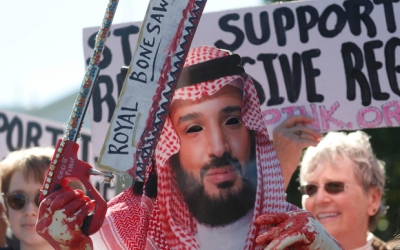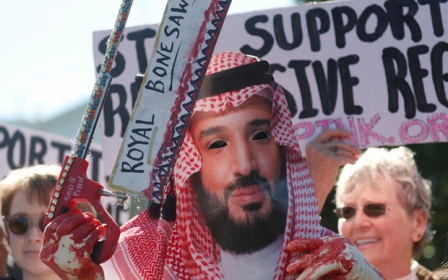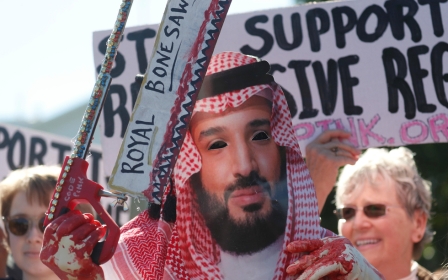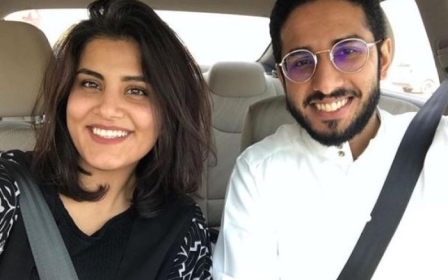Saudi court resumes trial of 'tortured' women's rights activists
A Saudi court on Wednesday resumed the trial of prominent women activists facing charges related to their human rights work and contacts with foreign journalists and diplomats, in a case that has sharpened international criticism of the kingdom.
The women, including rights campaigner Loujain al-Hathloul, university professor Hatoon al-Fassi and blogger Eman al-Nafjan, were expected to respond to the charges, including some that rights groups say fall under an article of the kingdom's cybercrime law stipulating jail sentences of up to five years.
Diplomats and media were denied entry to the hearing and escorted from the building, despite petitioning the authorities to attend amid global scrutiny of the case, the Reuters news agency reported.
Three dozen countries, including all 28 EU members, Canada and Australia, have called on Riyadh to free the activists.
Nine prominent US senators wrote a public letter last week asking King Salman for the immediate and unconditional release of prisoners held on "dubious charges related to their activism," citing many of the women currently on trial.
New MEE newsletter: Jerusalem Dispatch
Sign up to get the latest insights and analysis on Israel-Palestine, alongside Turkey Unpacked and other MEE newsletters
Earlier this month, the New York Times reported that a covert Saudi death squad that Middle East Eye exposed in October had been involved in the detention and abuse of the activists who were detained last spring and summer.
The squad is reported to have operated under the guidance and supervision of Mohammed bin Salman, the Saudi crown prince, who the CIA believes ordered the murder of the Saudi journalist Jamal Khashoggi last year.
Khashoggi, a columnist for the Washington Post and Middle East Eye, was killed by the unit, known as the Tiger Squad, in the kingdom's consulate in Istanbul on 2 October.
The death of Khashoggi, a prominent critic of the Saudi government, has severely tarnished the reputation of the crown prince who Saudi officials deny ordered the murder.
'Agents of embassies'
The activists were detained weeks before a ban on women driving cars in the conservative kingdom was lifted last June under efforts to relax social rules and boost the economy.
Dozens of other activists, intellectuals and clerics have been arrested separately in the past two years in an apparent bid to stamp out possible opposition.
The Saudi public prosecutor said last May that the women, along with several men, had been arrested on suspicion of harming Saudi interests and offering support to hostile elements abroad.
State-backed media labelled some of them as traitors and "agents of embassies," irritating Western allies.
Activists and diplomats have speculated that the arrests may have been aimed at appeasing conservative elements opposed to social reforms pushed by the crown prince.
They may also have been meant as a message to activists not to push demands out of sync with the government's own agenda.
UN job application
The charges against Hathloul include communicating with 15 to 20 foreign journalists in Saudi Arabia, attempting to apply for a job at the United Nations, and attending digital privacy training, her brother told members of Congress this month.
According to Hathloul's sister, Alia, the women were at first detained informally in what appeared to be an unused palace in Jeddah.
Activists groups say some of them, including Hathloul, were held in solitary confinement and subjected to mistreatment and torture, including electric shocks, flogging and threats of rape and murder.
In an op-ed article for the NYT in January, Alia said that Saud al-Qahtani, one of bin Salman's closest aides who ran the Tiger Squad, was "present several times" when her sister was tortured, and that he threatened to kill her and throw her body in the sewer.
Saudi officials have denied those allegations.
It remains to be seen if Riyadh will bend to international pressure, with the women possibly receiving acquittals or pardons, or pursue harsh sentences.
The case was apparently moved from a high-security terrorism tribunal to the Riyadh criminal court at the last minute without explanation, possibly signalling a more lenient handling of the cases after months of lobbying by Western governments.
British Foreign Secretary Jeremy Hunt and US Secretary of State Mike Pompeo both raised the issue during recent visits to Riyadh.
Middle East Eye delivers independent and unrivalled coverage and analysis of the Middle East, North Africa and beyond. To learn more about republishing this content and the associated fees, please fill out this form. More about MEE can be found here.






